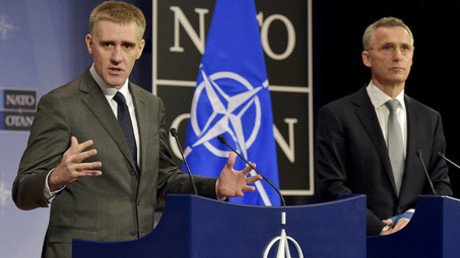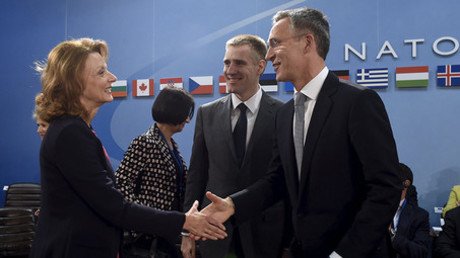Montenegro parliament strips 2 anti-NATO lawmakers of immunity
The Montenegrin parliament has voted to strip two anti-NATO opposition parliamentarians of their immunity from prosecution citing involvement in a coup attempt last October. To avoid unrest, prosecutors assured protesters outside that the MPs are not facing immediate arrest.
All 42 members of the 81-seat parliament who were present on Wednesday, approved a motion filed by the Special Prosecutor for Organized Crime, Milivoje Katnic, which demanded the leaders of the opposition Democratic Front alliance, Andrija Mandic and Milan Knezevic, to be detained and eventually put on trial.
The rest of the MPs were absent from the voting session as several hundred activists protested outside the parliament building. Some 39 opposition MPs, including the 18 MPs from the Democratic Front, are currently boycotting the Montenegrin parliament.
Mandic and Knezevic joined the activists on Wednesday as the ruling Democratic Party of Socialists (DPS) decided their fate.
“We decided to oppose the dictatorial regime and there is no force which could stop us ... until we free Montenegro by democratic means,” Mandic told the crowd, according to AFP.
According to a statement on the parliamentary website, Mandic, 52, and Knezevic, 36, are suspected of “creating a criminal organization ... and preparing an attempt on the constitutional order and security of Montenegro.”
Both parliamentarians are being accused of organizing an alleged coup during national elections on October 16, which prosecutors claim also envisioned plans to kill the then-prime minister before seizing power.
To avoid a possible outbreak of violence amid ongoing protests over Montenegro’s future with NATO, the supreme state prosecutor Ivica Stankovic clarified that MPs will not be jailed immediately.
“In the concrete case the arrest should not be proposed,” Stankovic said in a statement citing notably the “presumption of innocence.”
The two MPs have repeatedly denied taking part in a coup, which the government has blamed on Russian and Serbian nationalists. Some 20 people, including two Russian citizens, are accused of attempting a coup in order to derail Montenegro's accession into NATO.
Montenegro, a former part of Yugoslavia, is in the process of joining NATO as the 29th state of the alliance. In May last year, NATO members signed an Accession Protocol for Montenegro, extending an ‘invitee’ status to the small Balkan country.
Once all 28 allies have ratified the Accession Protocol, Montenegro can join the alliance. So far, twenty-four of NATO’s 28 members have approved Montenegrin membership, endorsed during NATO's Warsaw summit in July 2016.
On Tuesday, NATO Secretary-General Jens Stoltenberg said its still not clear if and when the remaining four NATO members, including the US, will agree to accept Montenegro.
He pointed out that NATO is “on a good track to have the membership of Montenegro relatively soon” claiming that “there has been no sign that the US administration is not supporting the ratification.” Stoltenberg also added that France is also ready to ratify the protocol.
Montenegro, a nation of 620,000 people, is deeply divided between those who want to join NATO and others who seek protection from Russia, a traditional Slavic ally. Those opposing the move cite the atrocities committed by NATO in the 1999 war against the former Yugoslavia, which claimed the lives of many civilians in the alliance’s nationwide bombing raids against what was called military targets.
“We are traditionally against NATO. We are not against joining NATO just because of NATO aggression that happened in 1999. We are against because we see NATO as a problem and not a solution of the modern global world,” Nikola Jovanovic from the Democratic Front told RT.
The young politician pointed out that the “best solution” for his country is to stay “neutral,” together with Serbia, Montenegro, Bosnia and Herzegovina and Macedonia.
“We think that Montenegro is in deep political crisis because the regime in Podgorica is forcing NATO membership against the will of the vast majority of citizens,” as he called on the ruling party to declare a referendum on NATO membership.
The Montenegrin noted that his country is on the brink of a possible “civil unrest” unless the ruling party stops “aggressive attacks” on the opposition leaders that oppose NATO.
Jovanovic noted that having good relations with Russia is “traditionally,” historically and economically important for Montenegro. “We do not want to become a part of military alliance that is against Russia,” he noted.














